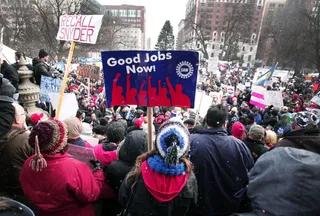How Michigan's "Right-to-Work" Laws Could Hurt Black Workers
Labor unions help secure higher wages for many Blacks.

1 / 8
A Change in Position - Michigan became one of 24 states to pass "right-to- work" laws this week, weakening the power of labor unions that have long been fixtures in the state's labor force. According to some reports, African-Americans and Latinos benefit most from labor unions, and now have the most to lose once the laws go into effect next year. – Britt Middleton (Photo: Bill Pugliano/Getty Images)

2 / 8
What Is a "Right-to-Work" State? - States operating under "right-to-work" laws allow employees to choose whether or not to join or financially support a labor union. Employees who work in the railway or airline industries are not impacted by "right-to-work" laws. Some federal employees may also be exempt. (Photo: Bill Pugliano/Getty Images)
Photo By Photo: Bill Pugliano/Getty Images

3 / 8
New Laws Passed - Michigan Gov. Rick Snyder signed into law two pieces of "right-to-work" legislation, one regarding private sector workers and the other for public employees. In both cases, the state prohibits requiring non-union employees to pay unions for services such as negotiating contracts and representing them in workplace grievances. (Photo: Leon Halip/Getty Images)

4 / 8
The Right to Decide - Despite mass protests at the state's capitol Tuesday, Snyder defended the legislation, calling them "pro-worker" and “pro-Michigan." Snyder and other state Republicans argue the laws help Michigan stay competitive with other states with similar laws. (Photo: Bill Pugliano/Getty Images)

5 / 8
An Act of War? - "Supporters say the law gives workers freedom of association and promotes job creation, while critics insist the real intent is to drain unions of funds needed to bargain effectively," writes the Associated Press. State Senate Democratic leader Gretchen Whitmer called the bills "an act of war on Michigan's middle class." (Photo: AP Photo/Paul Sancya)
ADVERTISEMENT

6 / 8
The Real Impact - "Union premiums" given to labor union workers help close the income gap. Last year, Black male union workers earned an additional $2.60 (17.3 percent) more per hour than non-union workers and Black female union workers earned $2.25 per hour (14.8 percent) more, according to the Economic Policy Institute. (Photo: AP Photo/Paul Sancya)

7 / 8
More Harm Than Good? - "Declining unionization rates are more likely to hurt Black workers, and cuts to all sorts of social programs, from public transportation to the safety net, have made it harder for Black workers to participate fully in the economy," writes Travis Waldron of ThinkProgress.org. (Photo: John Moore/Getty Images)
